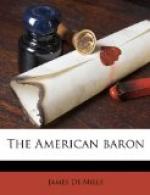“Well, we won’t argue about that; besides, I haven’t come to the point yet.”
“The point?”
“Yes, the real reason why I’m here, when I’m wanted home.”
“The real reason? Why, haven’t you been telling it to me all along?”
“Well, no; I haven’t got to the point yet.”
“Drive on, then, old man.”
“Well, you know,” continued Hawbury, “after hunting all through Canada I gave up in despair, and concluded that Ethel was lost to me, at least for the present. That was only about six or seven months ago. So I went home, and spent a month in a shooting-box on the Highlands; then I went to Ireland to visit a friend; and then to London. While there I got a long letter from my mother. The good soul was convinced that I was wasting my life; she urged me to settle down, and finally informed me that she had selected a wife for me. Now I want you to understand, old boy, that I fully appreciated my mother’s motives. She was quite right, I dare say, about my wasting my life; quite right, too, about the benefit of settling down; and she was also very kind to take all the trouble of selecting a wife off my hands. Under other circumstances I dare say I should have thought the matter over, and perhaps I should have been induced even to go so far as to survey the lady from a distance, and argue the point with my mother pro and con. But the fact is, the thing was distasteful, and wouldn’t bear thinking about, much less arguing. I was too lazy to go and explain the matter, and writing was not my forte. Besides, I didn’t want to thwart my mother in her plans, or hurt her feelings; and so the long and the short of it is, I solved the difficulty and cut the knot by crossing quietly over to Norway. I wrote a short note to my mother, making no allusion to her project, and since then I’ve been gradually working my way down to the bottom of the map of Europe, and here I am.”
“You didn’t see the lady, then?”
“No.”
“Who was she?”
“I don’t know.”
“Don’t know the lady?”
“No.”
“Odd, too! Haven’t you any idea? Surely her name was mentioned?”
“No; my mother wrote in a roundabout style, so as to feel her way. She knew me, and feared that I might take a prejudice against the lady. No doubt I should have done so. She only alluded to her in a general way.”
“A general way?”
“Yes; that is, you know, she mentioned the fact that the lady was a niece of Sir Gilbert Biggs.”
“What!” cried Dacres, with a start.
“A niece of Sir Gilbert Biggs,” repeated Hawbury.
“A niece—of—Sir Gilbert Biggs?” said Dacres, slowly. “Good Lord!”
“Yes; and what of that?”
“Very much. Don’t you know that Minnie Fay is a niece of Sir Gilbert Biggs?”
“By Jove! So she is. I remember being startled when you told me that, and for a moment an odd fancy came to me. I wondered whether your child-angel might not be the identical being about whom my poor dear mother went into such raptures. Good Lord! what a joke! By Jove!”




